

What It Takes To Form A Good Habit. I think "accountability buddy" really misses the point.

There is satisfaction and joy in accomplishing the task, but that's where accountability buddy is a misnomer. All habits of any sort will trip, falter, fail, etc. It's all about getting back in the game. People who falter in quitting smoking, depression, learning a new skill, taking up exercise or learning a new habit need a buddy who they enjoy doing it with and will help them get back in the game. We are humans and we love to connect and share experiences with - even introverts have a means by which they connect and share.
By far, the most important aspect of developing any habit is the actual doing of the habit. [From years of experience as fitness center owner/operator] The Secret is to Focus on the Change Process. I bet you have some harmful habits that you would love to change.
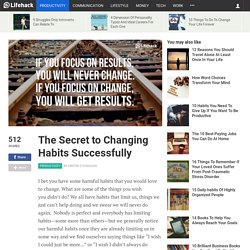
What are some of the things you wish you didn’t do? We all have habits that limit us, things we just can’t help doing and we swear we will never do again. Nobody is perfect and everybody has limiting habits—some more than others—but we generally notice our harmful habits once they are already limiting us in some way and we find ourselves saying things like “I wish I could just be more…” or “I wish I didn’t always do that”, and then we simply move onto the next thought, and it is forgotten. The Key To Lasting Behavioural Change: Think Goal, Not Tactic. Even the most motivated people can get stuck, frustrated, and lose hope during the process of behavioural change.
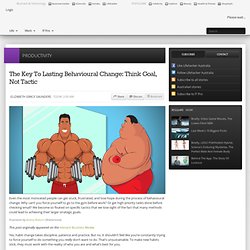
Why can’t you force yourself to go to the gym before work? Or get high-priority tasks done before checking email? We become so fixated on specific tactics that we lose sight of the fact that many methods could lead to achieving their larger strategic goals. Illustration by Andrey Makurin (Shutterstock) This post originally appeared on the Harvard Business Review.
Yes, habit change takes discipline, patience and practice. Track Every Small Progress for a Successful "Done List" Psychology’s Common-Sense Guide to Exercise. With the wide range of sources providing you with exercise advice, it’s hard to know whose guidelines to follow.
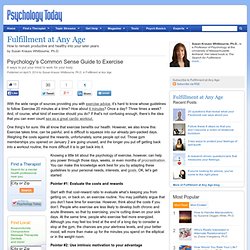
Exercise 20 minutes at a time? How about 4 minutes? Once a day? Three times a week? And, of course, what kind of exercise should you do? One thing’s for sure: We all know that exercise benefits our health. Knowing a little bit about the psychology of exercise, however, can help you power through those days, weeks, or even months of procrastination.
Pointer #1: Evaluate the costs and rewards Start with that cost-reward ratio to evaluate what’s keeping you from getting on, or back on, an exercise routine. Pointer #2: Use intrinsic motivation to your advantage Finding out what motivates you will help get you through your workout, but in the long term, it’s feeling internally driven that will make exercise an inherent part of your everyday life. 4 Ways to Deal With Selfish People. An acquaintance recently told me that she wished her grown children recognized how hard she had worked for them.
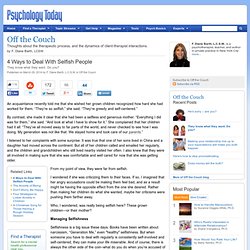
“They’re so selfish,” she said. “They’re greedy and self-centered.” By contrast, she made it clear that she had been a selfless and generous mother. You’re Not Worse Than Other People. By Leo Babauta I was talking to a loved one yesterday about her fears, and several times made the comment, “Everyone has these fears.
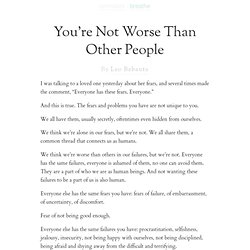
Everyone.” And this is true. 10 Things You Can Do Every Day To Benefit Your Brain. A mind is a valuable thing to waste.

You’ve heard the saying many times, but it truly does ring true. Your mind is your most valuable asset. You need to take care of it. So here’s a list of 10 things you can do every day to benefit your brain: 1. Refreshing your body can also help you improve brain function, increase memory, and improve your mood. 2. When you’re tired, your brain can be more creative. 3 Simple Steps to Better Productivity. A few years ago, I hired professional organizer and owner of Organize for Success Emily Parks to advise my team and I on ways to become more efficient.
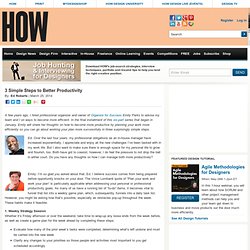
In the final installment of this six-part series that began in January, Emily will share her thoughts on how to become more productive by planning your work more efficiently so you can go about working your plan more successfully in three surprisingly simple steps. Ed: Over the last four years, my professional obligations as an in-house manager have increased exponentially. I appreciate and enjoy all the new challenges I’ve been tasked with in my work life. But I also want to make sure there is enough space for my personal life to grow and flourish, too. Both have got to coexist, however, I do feel the pressure to not drop the ball in either court. Emily: I’m so glad you asked about that, Ed. 1. 2. 3.